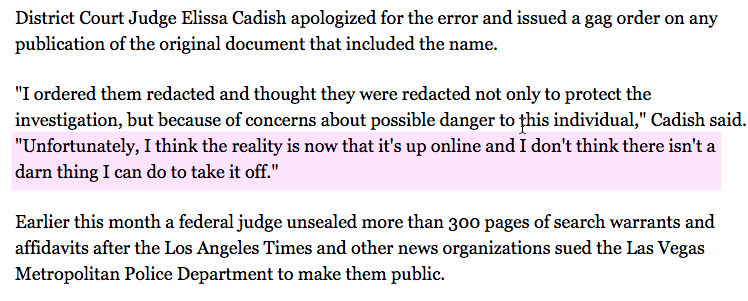"I don't think there isn't a darn thing I can do"
« previous post | next post »
RichG sent in a link to Matt Pierce and David Montero, "Warrants in Las Vegas mass shooting reveal name of additional 'person of interest", LA Times 1/30/2018 [emphasis added]:
Authorities were looking into an additional "person of interest" following the mass shooting in Las Vegas that killed 58 people and wounded hundreds of others, according to search warrants unsealed by a Nevada judge Tuesday.
Though Stephen Paddock has been identified as the lone gunman in the Oct. 1 massacre, and authorities had been looking at his girlfriend, Marilou Danley, the court mistakenly failed to redact another name from the warrants: Douglas Haig.
That is the name of a Mesa, Ariz., ammunition dealer who runs a website called Specialized Military Ammunition, which touts itself as "your source for premium, MILSPEC, tracer and incendiary ammunition in popular military calibers," including ammunition that "ignites diesel and kerosene." (Officials have said that Paddock shot at aerial fuel tanks during the attack, although they did not ignite.) […]
The Las Vegas Review-Journal was the only publication to receive the mistaken document, which identified Haig as a "person of interest." It's the first public acknowledgment by law enforcement that a third person had been investigated in relation to the crime.
District Court Judge Elissa Cadish apologized for the error and issued a gag order on any publication of the original document that included the name.
"I ordered them redacted and thought they were redacted not only to protect the investigation, but because of concerns about possible danger to this individual," Cadish said. "Unfortunately, I think the reality is now that it's up online and I don't think there isn't a darn thing I can do to take it off."
Rich comments, "I have no idea if this is an over-negation or a mangled misquote. My suspicion is the latter". Given years of experience with journalistic quote (in)accuracy., I tend to agree — but I'll add this to the misnegation archive anyhow.
Obligatory screenshot:

John From Cincinnati said,
January 31, 2018 @ 11:13 am
I entertain the possibility that this is neither an over-negation nor a mangled misquote. The article reports that the judge "said", so it might be a transcription of speech, although without pauses indicated. If so, what might have been said is "Unfortunately, I think the reality is now that it's up online and I don't think … (pause to recompose remarks) … there isn't a darn thing I can do to take it off." This would be what I consider a common disfluency of the form "I don't think … (pause) … ." Listeners can infer that the pause is to restructure the thought, and that the statement after the pause is the intended expression.
John From Cincinnati said,
January 31, 2018 @ 11:16 am
Sorry, I used angle braces and content was removed.
I meant: disfluency of the form "I don't think … (pause) … [thing that I do think]."
Terror Incognita said,
January 31, 2018 @ 11:50 am
Agreed with John above – that is fairly likely. Could it also be a dialectal feature where the judge's dialect uses further negatives as intensifiers (a la "can't get no satisfaction")? The quote uses fairly colloquial language ('darn thing') despite being a statement from a district court judge…
[(myl) The first option would be an egregious mistranscription, even if it presents the correct words in the correct order, since it totally misrepresents what the speaker said. The second option would be an example of what's known as "negative concord", which is one of the four possible reasons for the examples we've been cataloguing as "misnegation". Of course, for speakers who really do have negative concord in their grammar, rather than just the universal tendency to consider adopting it, there would be no "mis-" involved.]
Jack Makk said,
February 2, 2018 @ 8:40 am
Over-negation is a particular hazard in US speech due to the dialect being curiously disposed toward it in a very peculiar way (to my UK ear).
E.g. if I might say, 'See if you can find a spoon in the drawer'. Whereas in the US, the form is more often 'See if you *can't* find a spoon in the drawer'.
Negation comes 'pre-loaded' with positive intent in US speech, so it's unsurprising that there's this occasional negation pile-up.
Brett said,
February 2, 2018 @ 10:08 pm
@Jack Makk: I think the construction in, "See if you can find a spoon in the drawer," is quite a bit more common than, "See if you can't find a spoon in the drawer," in both America and Britain. I just checked, and Google N-grams agrees with me.
Andrew Usher said,
February 3, 2018 @ 7:15 am
Isn't it interesting that the ostensible point of the article is that this man's name should not have been released, and yet the article does so? Isn't that journalistic irresponsibility?
I agree with the first comment as to the most likely interpretation. I can't imagine any native speaker saying it like that.
k_over_hbarc at yahoo.com
Jack Makk said,
February 5, 2018 @ 11:44 am
@Brett – that's probably the case, but whenever I see the construction "See if you can't find a spoon" etc, it's a US speaker, and I'm speculating that the quirk lends itself more readily to (possible) negation pileups like this one. I do find the disfluency explanation above more persuasive in this case though.